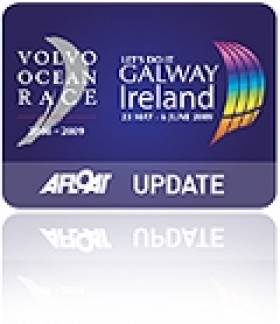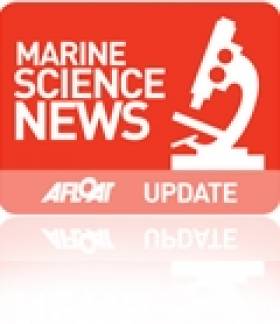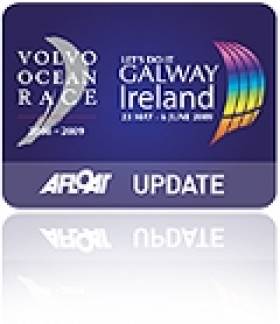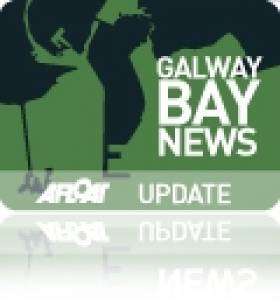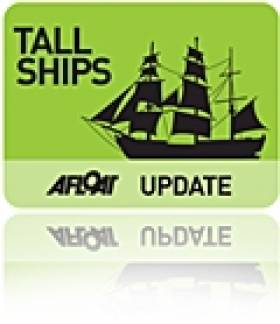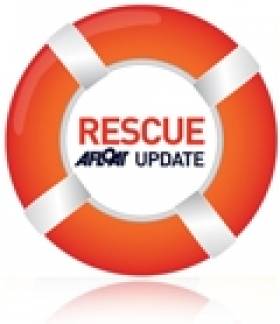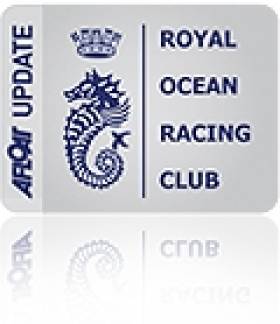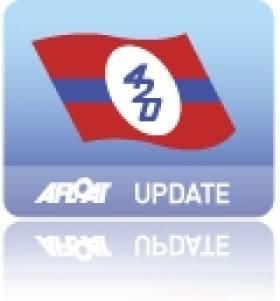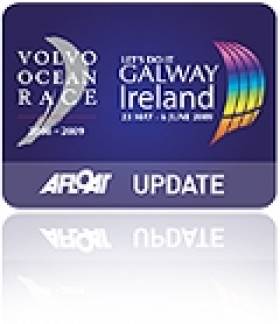Displaying items by tag: Galway
Green Dragon Sails Again
Ireland's Volvo 70 the Green Dragon was back on the water again yesterday, two years after she had finished fifth out of seven entries in the 2009 Volvo Ocean Race.
Attempts to sell it for two million euros in 2009 did not materialise. Since then, the round the world yacht has been in dry dock in Galway, rendered obsolete because her hull was heavier and keel lighter than her rivals.
In spite of the disappointing performance the boat was welcomed in to Galway after the 2009 Transatlantic leg by a huge crowd and a week long celebration that has subsequently set the bar for all other stop over ports in the 2012 race.
After being refitted and repaired recently, the Green Dragon sailed out of Galway Docks yesterday for a tour of the bay, before she sets sail for Holland tomorrow.
Ireland's entry in the 2008-9 Volvo entry race will be taking part in the Frankfurt Motor Show promoting the Volvo Ocean Race 2012 and the Global Village in Galway where the race will end next July.
Speaking to Galway Bay FM News, Green Dragon Chairman of Let's Do it Global Enda O'Coineen says 'the sail went great'.
Marine Institute to host ARCOPOL Oil Spill Modelling Workshop
The Marine Institute will be hosting an ARCOPOL oil spill modelling workshop in Galway on Tuesday 13 September.
This one-day workshop is an opportunity to discuss the development of common procedures, techniques and decision tools for the management of response to oil spills and other hazardous and noxious substances.
The event is being held at the Marine Institute, Rinville, Oranmore, Co Galway under the auspices of the EU Interreg Atlantic Area Project ARCOPOL, in which the Marine Institute is a participant.
For detailed information see the agenda which is available to download HERE.
All relevant professionals are invited; attendance is free but limited on a first-come-first served basis. Registration is mandatory by e-mail to [email protected].
Sanderson Unveils 'Discoverireland' on Team Sanya
Team Sanya are working in close partnership with 'Lets Do It Global', organisers of the Volvo Ocean Race Finish in Galway, under the 'discoverireland. com' brand.
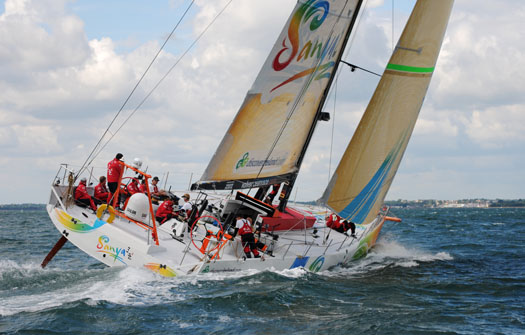
Team Sanya afloat in Irish colours. Photo: Tim Stonton
This is the second time China and Ireland have partnered with China to enter a boat into the Volvo Ocean Race. The first was with the Green Dragon Team in 2008-2009. Sanya, is situated in the southern most city in China and is a popular tourist destination. It is also where Rosanna Davidson won her Miss World title in 2003.
The chairman of Let's Do It Global Enda O'Coineen said ''this partnership with China and Ireland for Team Sanya is a dynamic collaboration of all Irish interests. Led by tourism, it will leverage the extraordinary opportunity the Volvo Ocean Race coming to Ireland presents. Having such a professional team and a skipper with the calibre of Mike Sanderson, twice winner of the Volvo Ocean Race and a Media Crew Member, Galway man Frankie Leonard on board we are assured of a very exciting race, culminating in the final in Galway on the 3rd July 2012. As final destination, Galway will host the largest festival in the country.
This is a major opportunity for the tourism sector and all Irish based businesses. We have developed "Global Village 2012" with four pillars, Food, Innovation, Green and Marine, as a platform to showcase to a global audience all that is good about doing business in Ireland."
The Volvo Ocean Rcae is regarded as sailing's premier global race and one of the most demanding team sports in the world. The race will begin on 29 October in Alicante, Spain and will finish in Galway early July 2012. is the stopover ports include Cape Town, Abu Dhabi, Auckland, Itajai in Brazil, Miami, Lisbon, and Lorient.
As reported previously on Afloat.ie, the Galway Harbour Company's €200 million scheme involves moving the port south onto 24 hectares of reclaimed land in deeper water to accommodate cruise liners, as well as a proposed rail link and marina expansion.
Following the public consultation earlier this year and subsequent discussions with An Bord Pleanála, the scheme has been deemed a 'strategic infrastructure development' and a planning application under this designation is expected to be lodged this month.
Famine Ship Needs €100K to Get Seaworthy
The Jeanie Johnston will need €100,000 to be made seaworthy again, it has emerged.
The three-masted barque - which not long ago sailed across the Atlantic - was missed at the weekend's Tall Ships festival, which attracted half a million visitors to Waterford.
But as the Sunday Independent reports, the ship is currently a stationary tourist attraction at berth in Dublin with her sails in storage.
Hopes are high, however, that the replica famine ship will be made ready as an ocean-going vessel in time for the Volvo Ocean Race in Galway next summer, not to mention the Tall Ships Races in Dublin next August.
"At the moment we are basically putting all the money coming in from the interactive tours, which have been very successful, back into the boat," said ship manager John O'Neill. "We are hopeful we will get the financial assistance we need to get the vessel back out to sea".
Two Rescued in Galway Bay After Powerboat Breakdown
BreakingNews.ie reports that a Galway lifeboat rescued two men from a powerboat in Galway Bay yesterday afternoon.
The men were found drifting close to rocks after their 19-foot broke down south of New Harbour shortly after lunchtime.
The Irish Coast Guard Rescue Helicopter and the RNLI Lifeboat responded in minutes to the men's distress call.
Sharkbait Wins SB3 Western Champs
Howth's Ben Duncan and the crew of Sharkbait were the winners of the SB3 Western championships on Galway bay.
The weather gods delivered some rip roaring racing with 25 boats taking to the race course in conditions varying from 15kt southerly to 29kt westerly.
The Howth crew beat Southern championship winner Peter Kennedy (Ridgefence)from Strangford for the top slot in the six race wind-leeward series. Although hosted by the local sailing club the unofficial race HQ was McSwiggin's pub near the city docks with sponsorship from Captain Morgan. Third was Brian Reilly's Boomsticks. 26 competed.
Teaming up for the first time since Mays world championships the Sharkbait team of Ben Duncan, Brian Moran and Ric Morris seemed to have an extra gear at crucial points in each of Saturday's first two races popping well clear. The 2009 national champions Peter Kennedy, Dave Cheyne and Stephen Kane on Ridgefence held on doggedly nipping at their heals before taking the last race of the day leading from gun to gun. The BWM liveried Boomsticks of the Reilly brothers and Johnny O'Dowd separated the pair with Sharkbait finishing third.
Sharkbait and Ridgefance have been here before at recent inland championships and on day 2 they began to mark each other on the race course from the first race. Starting next to each other both boats ended up mid fleet at the first mark. After pulling through on the run the two boats went to the right hand side of the course on the next beat with Sharkbait holding Ridgefence past the layline as both boats climbed into 3rd and 4th by the windward mark. By the end of the run Sharkbait was up to second behind Darragh Sheridan, Johnny Phelan and John Malone in Dinghy Supplies. Rob Howe, Paul McMahon and Joanne Sheehy 3rd with Ridgefence in 4th. All 4 team held these places to the finish.
The days second race was a near repeat with Sharkbait and Ridgefence rounding the windward mark together in mid pack before pulling through the fleet to finish 1st and 3rd, this time separated by Boomsticks. Having won the regatta with a race to spare Sharkbait headed to shore leaving Ridgefence and Boomsticks to close out 2nd and 3rd overall with a win and a 2nd in the final race. Andrew Algeo in Flutter finished 4th overall. Rob Howe followed up his 2nd place at the Southerns with a 5th place overall at the Westerns. Dinghy Supplies finished 6th.
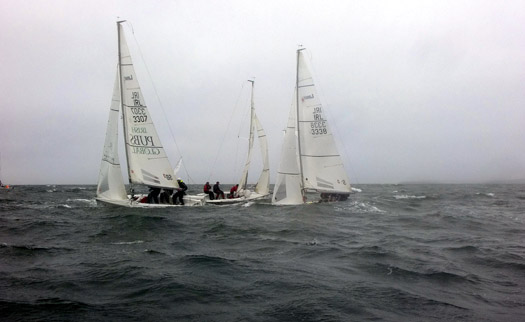
Action from Galway Bay. Photo: Cian Gallagher
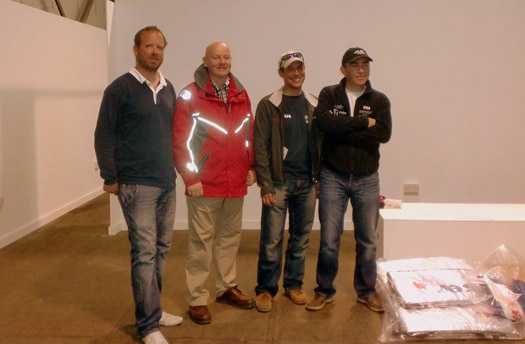
The Howth crew collected their prize from Galway harbour master, Brian Sheridan (wearing red jacket)
Bad weather is being blamed for two separate offshore sailing accidents at the weekend, one of which led to the death of a yachtsman.
A 46-year-old London man died after falling from a yacht competing in a race from Cowes to France.
At home, five yachtsmen had escaped harm when their craft hit rocks off the west coast at the weekend.
The 46-year-old British sailor lost his life after falling overboard during the race, which started in Cowes at 1900 on Friday night. It is understood that the accident took place approximately 17 miles South East of the Isle of Wight.
A RORC statement says "It is with great regret that the Royal Ocean Racing Club has to report a tragic loss of life during the RORC Morgan Cup race from Cowes to Cherbourg".
The Coastguard and Lifeboat services were called to assist the crew who recovered the man but were unable to revive him.
The boat returned to port in the UK overnight.
The yacht was one of seventy-two experienced offshore race boats taking part in the race.
Off Galway, yachtsmen competing in the overnight 'Round Aran race' were forced to abandon off the coast of Galway when their yacht hit rocks early on Saturday morning. The men, all experienced sailors, made it to land after they launched a life raft and raised the alarm.
Coaching Clinic in Advance of 420 Connachts
Galway Bay is laying on coaching ahead of racing at the 420 Connacht championships on July 2nd.
Coaching is available for all prospective participants, whether seasoned racers or sailors new to the class.
The coaching clinic will be run by GBSC and will include Will Leech, Rob Lehane and Ruardhri de Faoite.
Participants can come for either a 5 day (Mon-Fri) or 3 day (Weds-Fri) coaching clinic. This will give sailors who have spent lots of time stuck in their books to blow away the cobwebs and get fully tuned-up for the championship racing at the weekend.
John Leech, PRO for championship remarked: "GBSC is delighted to welcome the 420 fleet back to Galway Bay for the Connacht Championships. Galway is a superb centre for sailing activity as was demonstrated when the Volvo Ocean Race visited. It's a great opportunity for visiting 420 sailors to enjoy good racing and have some fun with the active fleet of 420s based here."
Details of racing are in the attached NOR. The entry form can be used to sign-up for the coaching clinic too.
Entry Costs:
Racing fee - €80 per boat
5 days coaching (27 June-1 July) fee - €200 per boat
3 days coaching (29 June-1 July) fee - €170 per boat
Coaching entries with fees must be received by 20th June - Cheques payable to GALWAY BAY SAILING CLUB.. Entries for racing only will be taken on the morning of 2nd July.
New CEO Announced for Galway Volvo Ocean Race Festival
Lets Do It Global, the organisation behind the Irish entry in to the Volvo Ocean Race and the Galway Race finish has announced a new Chief Executive Officer. It has also announced it is 'closing a seed fund' to support the race festival takikng place in just over a year's time.
The new CEO announced today is Fintan Healy. His appointment follows a selection process where there were 20 applicants. His specific focus will be the Volvo Ocean Race Finish in Galway 2012, the planned Festival and Galway's Global Village (Expo) 2012.
Healy will report to a new 'Advisory Board of Directors' coming together for 2012 to include prominent leaders from Business, Sport and the Arts - to be announced shortly, according to Lets Lets Do It Global.


























